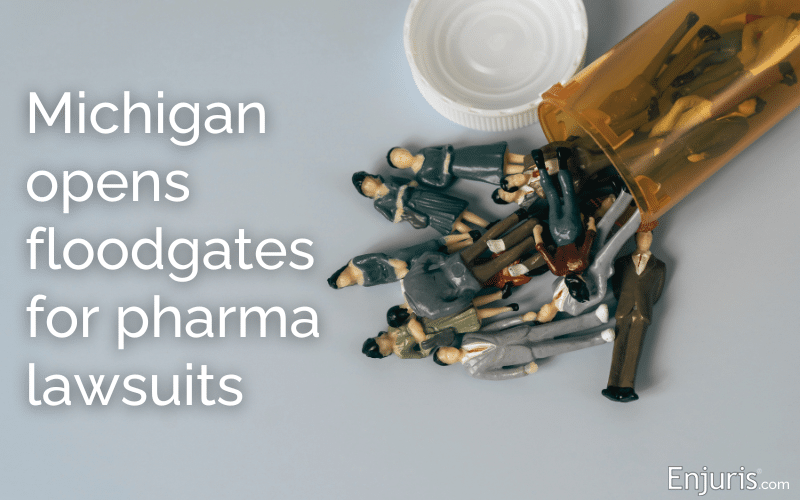[ad_1]

Michigan has enacted a new law that allows individuals to sue pharmaceutical companies for harm caused by defective drugs, ending 30 years of near-complete immunity for these companies.
For plaintiff’s attorneys, this opens a new avenue for litigation, challenging the previously unassailable position of pharmaceutical manufacturers and distributors in the state.
History of drug immunity in Michigan
Michigan’s Product Liability Act once granted an absolute defense to the manufacturers and sellers of FDA-approved pharmaceuticals in product liability suits. This was contingent on the drug and its labeling being in compliance with FDA approvals at the time of distribution.
However, this defense was not applicable if the drug was sold after the FDA had ordered its removal from the market or had withdrawn its approval.
Moreover, the defense was void if the manufacturer or seller had intentionally withheld or misrepresented information to the FDA that would have led to the drug’s disapproval or if they had made illegal payments to FDA officials to secure or maintain the drug’s approval.
In addition to preventing injured individuals and their families from obtaining compensation, Michigan’s immunity law hindered the Department of Attorney General’s efforts to tackle misconduct by some companies, particularly concerning the opioid crisis and insulin price gouging.
Michigan introduced its immunity law in 1995 as part of broader tort litigation changes. Proponents of the law argued that tort liability restricted drug manufacturers’ ability to invest in research, hindered the development of new, safer drugs, and caused an increase in liability insurance premiums for manufacturers and sellers. Critics, however, noted that Michigan already had a cap on noneconomic damages and the frequency of product liability cases was decreasing.
[H2] Michigan’s new law
Michigan’s new law (SB 410), which went into effect on February 13, 2024, removes the drug immunity that manufacturers and sellers have enjoyed for the past three decades.
Notably, the law leaves intact:
- A rebuttable presumption of non-liability when the product at issue complies with state or federal standards, and
- Annually adjusted caps on noneconomic damages.
For 2024, noneconomic damages are capped at $569,000 in bad drug cases, unless the defect caused death or permanent loss of a vital bodily function, in which case noneconomic damages are capped at $1,016,000.
“The Michigan Product Liability Act has been used for far too long to shield pharmaceutical companies from accepting responsibility when they knowingly defraud and harm the public. I applaud the legislature for finally addressing this one-of-a-kind bill that placed protections for large corporations over the safety of Michigan residents.”
The full text of the new law can be found at Mich. Comp. Laws § 600.2946.
The impact of Michigan’s new law on plaintiffs’ attorneys
Plaintiffs’ attorneys in Michigan are poised to see an increase in product liability cases against pharmaceutical companies. This uptick is expected particularly in areas concerning opioid misuse, insulin price gouging, and Medicaid fraud. These areas represent not just a heightened societal concern but also a legal battleground for addressing corporate accountability and consumer protection.
It’s crucial for plaintiffs’ attorneys to understand that the new law is likely not retroactive. This means it probably won’t apply to cases where plaintiffs were injured before the law’s effective date but decide to file suit afterward. This interpretation relies on Michigan’s established LaFontaine factors, which are used to assess a law’s retroactivity. The absence of language explicitly stating the law should be applied to past events is a significant factor. Moreover, the law introduces new obligations for manufacturers and sellers, reinforcing its prospective application only.
[ad_2]



